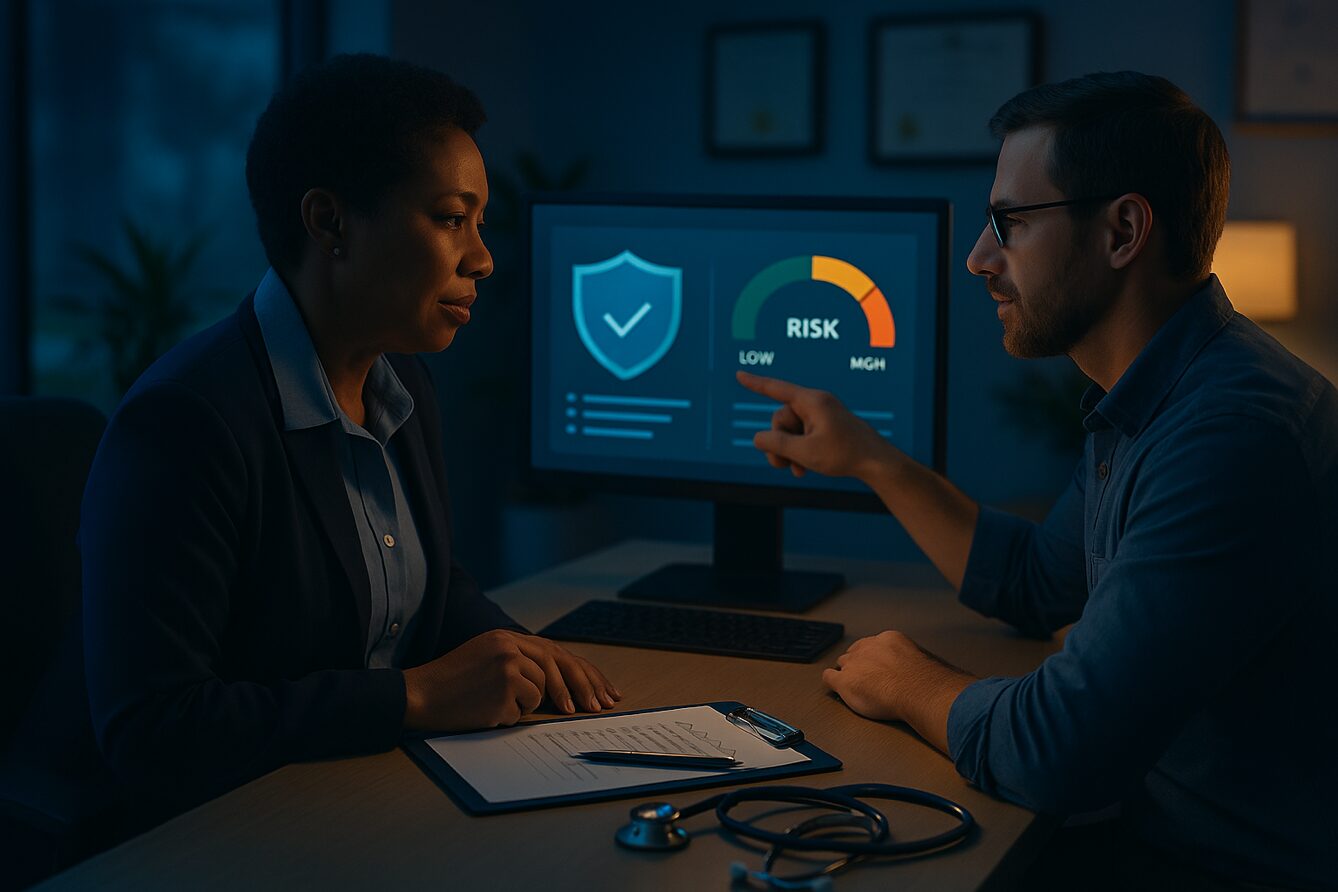The healthcare industry is a huge target for cybercriminals. This article will review cybersecurity for healthcare and how to protect PHI in a digital world
Organizations are Under Attack
As healthcare organizations have embraced digital technology and have increasingly gone online, their related risks and challenges have skyrocketed. Organizations rely on technology to facilitate improved patient safety, streamline operations, and store vast amounts of confidential patient information. Unfortunately, the large amounts of personal health information (PHI) stored by healthcare providers and hospitals in the cloud and online have made healthcare organizations a target for cybercriminals. The healthcare sector faces significant risks from ransomware or malware attacks, data breaches, and data losses and must take steps to protect the sensitive patient information healthcare organizations handle.
When bad actors exploit a healthcare facility’s vulnerabilities, the results can be devastating. The privacy of patients can be compromised, healthcare services can be disrupted, and lives can be endangered. Bad actors can steal patient information from electronic health records and cause severe damage to their credit while also harming the finances of the healthcare facilities they breach. The importance of healthcare cybersecurity can’t be overstated. The healthcare sector must identify and address vulnerabilities and take proactive measures to prevent cyberattacks.
Cyberthreats Faced by Healthcare Organizations
Healthcare facilities hold vast amounts of sensitive healthcare data while providing critical patient care. These factors have made them attractive targets for bad actors. If cybercriminals successfully breach a hospital, they can steal private identity information and sell it on the dark web. They can also wreak havoc by disrupting the facility’s operations and potentially endangering patients.
Between 2015 and 2022, attacks on facilities within the healthcare industry accounted for 32% of all data breaches that occurred. Because of these attacks, impacted hospitals have faced severe reputational and financial repercussions, and many patients’ sensitive data has been exposed.
Ransomware is among the most common types of cyberattacks used against healthcare organizations. These CY attacks involve critical systems and encrypted personal data, making them inoperable and inaccessible unless the facility pays a ransom to the cybercriminals. In September 2023, 18 ransomware attacks against hospitals occurred, representing an 86% month-over-month increase. On average, a report by IBM Security found that a hospital data breach costs an estimated $10.93 million.
The costs of a data breach extend well beyond financial losses. When a hospital’s systems are breached, the hospital’s reputation will be damaged, and there will be a resulting loss of trust. Large-scale data exposure can erode the confidence people have in the healthcare system. Hospitals can also face regulatory penalties and fines if they haven’t appropriately secured sensitive patient data.
Challenges Posed by Connected Medical Devices
Medical devices connected to the internet have transformed the delivery of healthcare by allowing real-time patient monitoring and seamless communication. Unfortunately, connected medical devices also come with a higher cybersecurity risk. Any exposed vulnerabilities in connected devices can be exploited. Bad actors can use them to disrupt operations and access patient information.
Because of this, healthcare facilities must include connected devices in their security infrastructure and implement appropriate cybersecurity measures to secure them by conducting regular updates, encrypting data while the devices are at rest and during data transmission, and implementing robust authentication protocols.
Stakeholders and Security
To address a healthcare organization‘s security needs appropriately, stakeholders must work collaboratively. Facilities must comply with regulations and implement safeguards designed to protect sensitive patient information. Information security professionals must secure the networks of healthcare systems and take proactive measures to identify and fend off cyberattacks before they happen. Hospitals should invest in training programs to ensure their employees are educated about best security practices.
However, hospitals often have trouble finding qualified security professionals to handle their cyber needs. Budget constraints combined with a shortage of skilled professionals can make implementing effective security measures difficult. To get around this issue, many healthcare facilities partner with third-party providers to handle their cybersecurity needs. This allows them to access the professional help they need.
Healthcare Compliance
Hospitals and other medical facilities must comply with stringent regulations to protect patient privacy and data. In the U.S., the Health Insurance Portability and Accountability Act (HIPAA) is a major patient privacy law under which healthcare facilities are regulated. If a facility fails to comply with HIPAA, it can face substantial penalties. To comply with HIPAA, healthcare facilities must implement strict security measures, including regular risk assessments, data encryption, and strict access controls.
Why Information Security in Healthcare Is Critical
Information security in healthcare is critical for all of the following reasons:
- Protecting sensitive patient information to maintain regulatory compliance and patient trust
- Protecting patient health
- Safeguarding the facility’s intellectual property, including research
- Ensuring the continuity of care by avoiding disruptions
- Minimizing potential risks of legal liability and financial penalties
Here’s a more in-depth look at each of these factors:
Protection of Patient Privacy and Data
One of the main reasons why healthcare facilities must emphasize IT security (SE) is to ensure patient data is protected. Protected health information includes a wealth of private information about patients, including names, Social Security numbers, addresses, medical histories, and more. In a healthcare data breach, this data can be used by bad actors to commit identity theft, extortion, and fraud, making data privacy important. Robust security measures can help organizations safeguard privacy and maintain regulatory compliance.
Keeping Patients Safe
Healthcare facilities rely on technology to deliver quality care to patients. Cyberattacks can lead to downtime, making electronic medical records inaccessible and causing delays in critical care services. Attacks on connected devices and apps could directly threaten the safety of patients. Implementing stringent security measures can mitigate risks of disruptions and help facilities maintain the quality of care.
Maintaining Patient Trust
Patients need to know they can trust their doctors and that their private information will be secure. Security incidents and data breaches can destroy patient trust and cause them to seek care elsewhere. Patients might also avoid providing critical information to their doctors if they believe their information could be at risk. Having strong security measures in place can help facilities and providers maintain patient trust and protect their reputations.
Protecting Research and Intellectual Property
Many institutions and hospitals conduct invaluable research. This data can be targeted by cybercriminals operating from abroad. The theft of these types of information can lead to setbacks in new technologies and treatments and significant financial losses.
Maintaining Regulatory Compliance
The Health Insurance Portability and Accountability Act (HIPAA) is strictly enforced. This law includes strict security regulations that hospitals and other medical facilities must follow when dealing with patient information. Failing to comply with these laws can lead to severe legal repercussions and financial penalties.
Minimizing Legal and Financial Risks
Healthcare facilities can face substantial financial and legal repercussions when data breaches occur. Multiple costs can be involved, including notification, remediation, legal settlements, and credit monitoring, and they can quickly build. The damage to a hospital’s reputation following a well-publicized cyber attack can also cause ongoing losses. Cybersecurity helps to minimize these risks and protect the facility’s financial stability.
Common Healthcare IT Security Risks
Some common IT security risks within the healthcare sector include the following:
- Use of outdated, highly vulnerable computer systems without modern security features
- Multiple interconnected parties, including insurance companies, clinics, hospitals, and vendors, which might each have differing security levels
- Storage of high-value patient data since patient records include sensitive information
- Connected medical devices and the Internet of Medical Things (IoMT) introduce additional vulnerabilities
- Lack of information security training for healthcare professionals
How Facilities Can Strengthen Security Measures
In light of the severe threat landscape confronting healthcare facilities, organizations must take proactive measures to strengthen and enhance their security. Organizations should conduct regular assessments to identify vulnerabilities anywhere in their networks and devices so they can be corrected. Prioritizing investments in security is not optional. It’s a necessity.
Medical facilities should implement comprehensive frameworks for security to build and maintain robust programs. One example is the NIST Cybersecurity Framework, which can help organizations prevent attacks from occurring.
Organizations should also segment their networks. This helps to limit the potential impact of a data breach by preventing unauthorized access to patient information. Software and hardware should always be kept up-to-date with the latest updates and patches. While hospitals increasingly rely on artificial intelligence and the Internet of Things, they must also understand the risks they might introduce. Cyber AI might also be a way to harness the power of artificial intelligence to assess data stream patterns and identify abnormalities automatically.
All employees should be fully trained on security measures to increase awareness of potential threats. This can help individual staff members to quickly identify potential threats so the facility can respond. The facility should develop a thorough incident response plan and test it to ensure its effectiveness in the event of a breach.
Additionally, third-party vendors should be required to have stringent security measures in place, including multi-factor authentication. Regular audits should be conducted to ensure they meet security standards. Finally, facilities should implement strong authentication protocols and data encryption to prevent unauthorized access.
Healthcare Cybersecurity Best Practices
Some best practices healthcare institutions might consider include the following:
- Complete risk assessments regularly to identify vulnerabilities and mitigate risks.
- Implement multiple layers of defense, including digital technologies like intrusion detection, firewalls, secure gateways, and cyber AI.
- Use strong authentication protocols to restrict access to those with a need to know.
- Encrypt data at all stages to protect its integrity and confidentiality.
- Hold regular, comprehensive security training for employees to ensure they understand how to identify and report phishing attempts and other cyber threats.
- Create a robust incident response plan for how your organization will respond to incidents, including investigation, containment, and recovery steps.
- Stay up-to-date on the latest emerging threats and trends.
- Partner with expert third-party healthcare cybersecurity companies to supplement your facility’s internal IT resources.
In the digital world, the importance of data protection should not be overlooked in the healthcare sector. Hackers are frequently targeting healthcare facilities to gain access to their electronic health record systems (EHRS), steal sensitive patient data, and wreak havoc. By taking proactive cybersecurity measures, organizations can maintain regulatory compliance, protect patient privacy, and ensure quality care. If you want to learn more about the importance of healthcare cybersecurity, contact us today.



